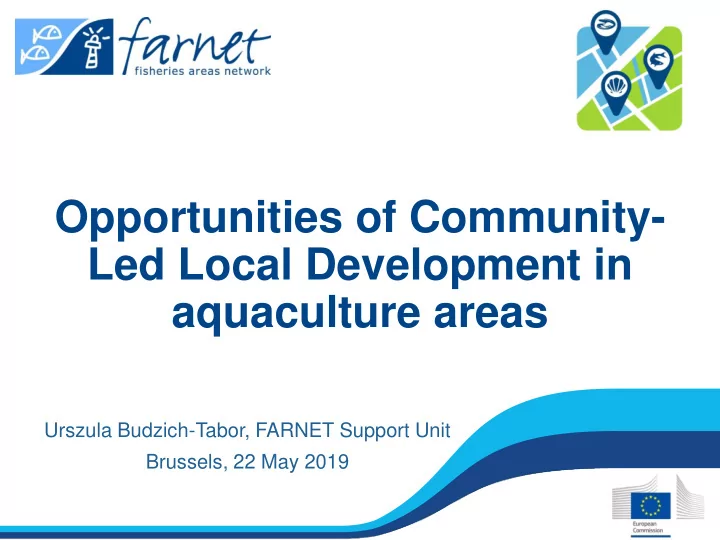

Opportunities of Community- Led Local Development in aquaculture areas Urszula Budzich-Tabor, FARNET Support Unit Brussels, 22 May 2019
Key features of Community-Led Local Development (CLLD) Government (national / regional) Managing Paying Authorities Agencies Project Project Project Project
Key features of Community-Led Local Development (CLLD) Government Government (national / regional) (national / regional) Managing Paying Managing Paying Authorities Agencies Authorities Agencies Partnership FLAG* Local Development Strategy Project Project Project Project Project Project Project Project *Fisheries Local Action Group
FLAGs operate in… Inland Few strong fisheries Extensive (carp areas ponds,..) Very dispersed and Intensive (trout, often part time eel,..) fisheries Fisheries Aquaculture Strongly dependent Fishfarming (seabass, areas (variety of fleet seabream, salmon ,…) segments) Dispersed fisheries Other cultures areas (mostly (shellfish, seaweed,…) SSCF) Marine
Key challenges faced by aquaculture producers in FLAG areas (from discussions at the FARNET seminar, November 2017): No. of responses: 94 66% 57% 48% 35% 32% 31% Community Environmental User conflict for Limited market Legislation/licensing Diversifying sources acceptance concerns space opportunities of income other challenges identified in the discussion: protected predators (mainly cormorants), lack of adapted funding mechanisms
What can FLAGs do to help? • Promoting consumption of products coming from local (sustainable) aquaculture • Facilitating linkages with other actors in the community (e.g. gastronomy & tourism) and with research • Capacity building for producers to improve product quality and environmental impact • Raising awareness about aquaculture products, starting with children and youth • Help producers to influence decision-making (local & national levels)
Building the area’s identity around aquaculture Tirschenreuth FLAG, Germany • Valorising the 800 years heritage of carp ponds (fisheries museum, educational aquarium, viewing platform) • Mobilising a large number of partners • Support to fish farmers to gain extra income from sustainable tourism attracted by high natural value of ponds • Promotion of fish consumption (training for chefs, recipes, events & festivals, promotional material)
Helping oyster farmers to detect toxic algae Pyrénées-Méditerrannée FLAG (France) • Oyster farmers struggling with toxic algae in high demand season • Collaboration with a biotech company and local authorities • Cost-effective and easy to use testing methods • Help farmers anticipate toxic proliferation and decide for an early harvest to avoid economic losses
Organic certification of carp products East Oberlausitz FLAG, Germany • Overhaul of production methods (i.a. to address issues of diseases) • Develop new range of fresh and smoked carp products • Common branding, promotion and marketing • Stimulated cooperation between producers, with retailers and consumers, created 1 job
Duckweed for fish feed Kainuu-Koilismaa FLAG, Finland • Capturing nutrients from a fish farm to produce local protein ingredients ( Lemna minor ) • More environmentally-friendly and cost-effective fish farming • Partners: fish farm, feed producer, LAG (funding) and FLAG (funding, expertise) • Project in the pilot phase, feed recipes to be tested
Awareness raising, starting with the young Opole Region FLAG, Poland • Training on how to cook local fish (carp and trout)* • Cookery classes for gastronomy school students (6 courses) and for chefs (10 courses) • Strong role in the FLAG of the Polish Anglers ’ Association, cooperation with the local LAG (rural development) *Poland has one of the lowest fish consumption per capita in Europe, and highly seasonal
Facilitating access to qualified staff Arcachon FLAG, France • Strong seasonality of oyster demand, lack of qualified staff at peak season • Complementarity with the fishing season • FLAG helped set up an association of maritime employers to identify, attract and recruit young people to work on different marine activities during the year in line with different seasonal needs
Some common elements • Several partners involved • Wide range of objectives and activities • Long-term perspective and impact (strategic) • Facilitation and support (not only financial) by the FLAG • Fisheries and aquaculture sectors at the core
Thank you! Any questions? www.farnet.eu urszula@farnet.eu follow us on The content and views expressed in this presentation are those of the FARNET Support Unit and not those of the European Commission.
Recommend
More recommend